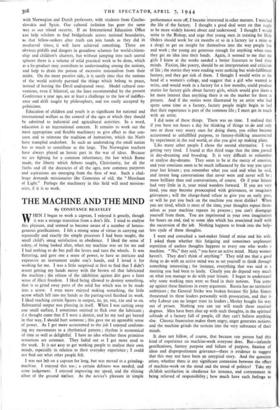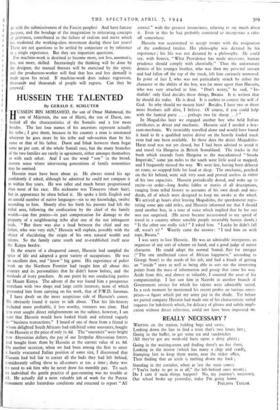THE MACHINE AND THE MIND
By CONSTANCE REAVELEY
WHEN I began to work a capstan, I enjoyed it greatly, though it was a strange transition from a don's life. I tried to analyse this pleasure, and seemed to become aware of a number of hetero- geneous gratifications. I felt a strong sense of virtue in carrying out repeatedly and exactly the simple processes I had been taught, the small child's smug satisfaction in obedience. I liked the sense of safety, of being looked after, when my machine was set for me and I had nothing to do but pull the levers and turn the wheels. It was flattering, and gave one a sense of power, to have so intricate and expensive an instrument under one's hands, and I loved it for working for me. I was a little surprised at first to find that I didn't resent getting my hands messy with the brown oil that lubricated the machine ; the release of the inhibition against dirt gave a faint sense of illicit freedom. I liked being allowed to destroy something, that is to grind away parts of the solid bar which was to be made into a screw. I even more enjoyed making something, the little screw which fell into my hands as the parting-tool finished its work. I liked reaching certain figures in output, 20, 50, 100, 120 and so on. Substantial output was pleasing in itself. When I was cutting away one small surface, I sometimes omitted to flick over the lubricant ; tie thought came that if I were a dentist, and let my tool get heated in that way, I should hurt someone ; this gave me an agreeable sense of power. As I got more accustomed to the job I enjoyed conform- ing my movements to a rhythmical pattern ; rhythm is economical of time as well as delightful. I have no idea whether these primitive sensations are common. They faded out as I got more used to the work. It is not easy to get working people to analyse their own minds, especially in relation to their everyday experience ; I could not find out what other people felt.
I was not left on a capstan for long, but was moved to a grinding- machine. I enjoyed this too ; a certain deftness was needed; and some judgement. I enjoyed improving my speed, and the shining silver of the ground surface. As the novice's pleasure in 'simple performance wore off, I became interested in other matters. I watched the life of the factory. I thought a good deal went on that ought to be more widely known about and understood. I thought I would write to the Bishop, and urge that young men in training for Holy Orders should work for six months or so in a factory (or a mine or a shop) to get an insight for themselves into the way people live and work ; the young are generous enough for anything when once they get an idea into their heads. Again, it seemed to me that the girls I knew at the works needed a better literature to feed their minds. Fiction, like poetry, should be an interpretation and criticism of life ; the stories they were reading were nothing but wish-fulfilment fantasy, and they got sick of them. I Thought I would write to the head of a women's college, and suggest' that a girl who wanted to write, and would work in a factory for a few months, could produce stories for factory girls about factory girls, which would give them a lot more interest than anything there is on the market for them at present. And if the stories were illustrated by an artist who had spent some time in a factory, factory people might begin to feel that their experience is part of the common life ; I must get in touch with an artist.
I did none of these things. There was no time. I realised that if you have ten hours a day for thinking of things to do and only two or three very weary ones for doing them, you either become accustomed to unfulfilled purpose, to fantasy-thinking uncorrected by experiment in the real world, or else you give up making plans.
Like many other people I chose the second alternative. I was getting very tired. I found at this third stage that the time passed in day-dreaming and brooding. It is very difficult to remember or analyse day-dreams. They seem to be at the mercy of emotion, and your emotions seem to be much influenced by the way you spent your last leisure ; you remember what you said and what he said, and invent long conversations that never were and never will be ; more brilliant than real conversations, of course. Or if your leisure had very little in it, your mind wanders forward. If you are very tired, you may become preoccupied with grievances, or imaginary grievances ; will the charge-hand refuse to give you an early pass, or will he put you back on the machine you most dislike? When you are tired, which is most of the time, your thoughts repeat them- selves as your machine repeats its process ; you can't disengage yourself from them. You are imprisoned in your own imagination for hours on end, tied to some idea which has associated itself with the succession of the job. Nothing happens to break into the help- less- cycle of these thoughts.
I went and consulted a tool-maker friend of mine and his wife. I asked them whether this fatiguing and sometimes unpleasant repetition of useless thoughts happens to every one who works a machine. " No," they said, " you have an active mind. Many women haven't. They don't think of anything." They told me that a good thing to do with an active mind was to set yourself to think through something interesting ; for instance, everything that was said at a meeting you had been to lately. Clearly you do depend very much on what you manage to do with your leisure. I began to understand why some working men were so fixed in their notions. You come up against these fixations in every argument. Russia has no territorial ambitions ; the General Strike was broken because •Sir John Simon threatened its three leaders personally with prosecution, and that is why Labour can no longer trust its leaders ; Mosley bought his way out of prison. Nothing you can say will touch these received dogmas. Men have been shut up with such thoughts, in the spiritual solitude of a factory full of people, till they can't believe anything else. Chronic frustration makes them angry, anger generates notions, and the machine grinds the notions into the very substance of their minds.
It does not follow, of course, that because one person had this kind of experience on machine-work everyone does. But—infantile gratifications, fantasy purpose and failure of purpose, fixation of ideas and disproportionate grievance—there is evidence to suggest that this may not have been an untypical story.. And the question arises, whether there is any significant .connexion between the effect of machine-work on the mind and the trend of politics? Take my childish satisfaction in obedience for instance, and contentment in bring relieved of responsibility ; how much have such feelings to
do with the submissiveness of the Fascist peoples? And have fantasy purpose, and the bondage of the imagination to reiterating concepts of grievance, contributed to the failure of realism and nerve which has weakened the working-class movement during these last years? These are not questions to be settled by conjecture or by reference to a single experience. But they are important questions.
For machine-work is destined to become more, not less, automatic, less, not more, skilled. Increasingly the thinking will be done by the designer, the manual finesses will be exercised by the setter, and the production-worker will find that less and less dcmarld is made upon his mind. If machine-work does induce regression, thousands and thousands of people will regress. Can they be renewed:



























 Previous page
Previous page